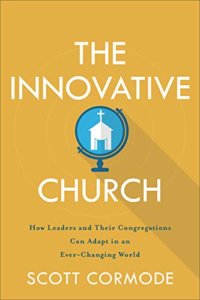Scott Cormode says you can’t approach complex leadership challenges with a preformulated, step-by-step plan. When facing complex and unpredictable challenges, a Christian leader’s responsibility is to help people take the next faithful step.
Most people want the wrong things from a leader. I remember talking with a committee that was getting ready to interview candidates to be the president of their Christian nonprofit. They were looking for two things in a candidate. They wanted a vision, meaning someone who could say, “This is where we are going.” And they wanted a plan, meaning they also wanted the person to say, “And here’s how we are going to get there.” In short, they wanted a leader who could tell them the next seven steps that would help them reach their goal.
Step-by-step leadership models don’t work in unpredictable times.
I understand why we long for such leaders. But there is a problem with that kind of leadership. It won’t work. Or at least it won’t get us the things that matter most. This lay-out-the-steps leadership model works great if you are doing something predictable and unchanging like putting together a bicycle on Christmas Eve. There you want step-by-step instructions. But step-by-step instructions only work in a predictable world and, even then, only with technical problems. Adaptive challenges require agility.
Our goal as Christian leaders is not to put together a ministry like it is a prepackaged bicycle. Our goal is to help God’s people grow. Like Paul and Apollos, we plant and water. If our goal is to help people grow, then we cannot follow the lay-out-the-steps model of leadership. What then can a Christian leader do?
Take the next faithful step.
I believe that a Christian leader’s responsibility is to help God’s people take the next faithful step. The temptation is to feel the need to take the next seven steps. But all we can do is take the next faithful step. Indeed, the best process looks something like this: Listen, and then take the next faithful step; then listen, and take another faithful step. And so on.
Why is it important to take one faithful step at a time? Because we can’t predict in advance what steps will be necessary. Think, for example, of the congregation that wanted to do the relatively straightforward project of building a fellowship hall on the church property. They expected to form a committee, draw up plans, collect the funds, hire a contractor, and build the hall. But at each step along the way, they discovered things about themselves that made the next faithful step anything but straightforward. Even forming the initial committee proved challenging. It brought up latent controversies between the church staff and the church board about formal control. It stirred up buried resentment between wealthy but nominal church members and poor but active members about informal control. Indeed, the pastor was wise enough to see the process for what it was. The next faithful step for the congregation, she wisely realized, was not forming a committee. The next faithful step was dealing with the long-buried resentment over control that needed to be addressed before the congregation was ready to form a committee. If the pastor had stuck to the plan, she never would have helped the congregation take the next faithful step. Building a fellowship hall was a technical problem but dealing with the control questions was an adaptive challenge.
Adaptive challenges are never predictable.
Indeed, adaptive challenges are never predictable. They always require leaders who are agile. Now don’t get me wrong. I do believe that the leader of that congregation has to have a general outline of how the process would go. But she had to hold the process loosely enough to be able to adjust to the needs of each step. Otherwise, her congregation could have built the hall, but they would not have grown in faithfulness.
Focusing on the next faithful step is crucial because taking that next step is often painful. And painful steps take time. In fact, it is often tempting to gloss over the painful part (the growing part) in the name of progress. But, really, that only helps us if our goals have nothing to do with helping people grow.
We often look for the wrong things in our leaders. We look for people who will tell us where to go and what to do. But what we need are leaders who can help us grow. In short, we need leaders who will help us take the next faithful step.
 This material is reprinted from The Innovative Church: How Leaders and Their Congregations Can Adapt in an Ever-Changing World © 2020 by Scott Cormode, published by Baker Academic, a division of Baker Publishing Group. Used by permission. The book is available at Cokesbury and Amazon.
This material is reprinted from The Innovative Church: How Leaders and Their Congregations Can Adapt in an Ever-Changing World © 2020 by Scott Cormode, published by Baker Academic, a division of Baker Publishing Group. Used by permission. The book is available at Cokesbury and Amazon.
Related Resources
- “Recalibrating the Church,” a Leading Ideas Talks podcast episode featuring Scott Cormode
- Conquering the Challenges of Change by Ann A. Michel
- Take the Next Step: Leading Lasting Change in the Church by Lovett H. Weems Jr.







